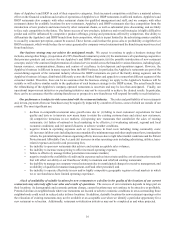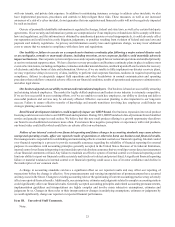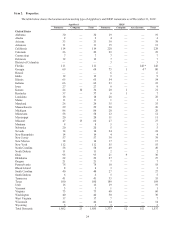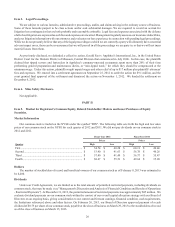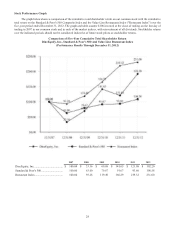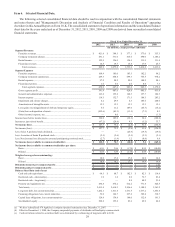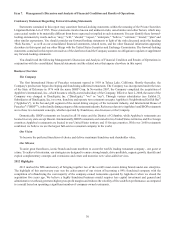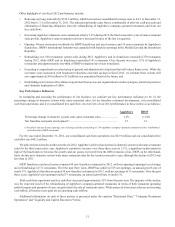IHOP 2012 Annual Report Download - page 41
Download and view the complete annual report
Please find page 41 of the 2012 IHOP annual report below. You can navigate through the pages in the report by either clicking on the pages listed below, or by using the keyword search tool below to find specific information within the annual report.23
with our tenants, and private data exposure. In addition to maintaining insurance coverage to address cyber incidents, we also
have implemented processes, procedures and controls to help mitigate these risks. These measures, as well as our increased
awareness of a risk of a cyber incident, do not guarantee that our reputation and financial results will not be negatively impacted
by such an incident.
Our use of personally identifiable information is regulated by foreign, federal and state laws, as well as by certain third-party
agreements. If our security and information systems are compromised or if our employees or franchisees fail to comply with these
laws and regulations, and this information is obtained by unauthorized persons or used inappropriately, it could adversely affect
our reputation and could result in costly litigation, judgments, or penalties resulting from violation of federal and state laws and
payment card industry regulations. As privacy and information security laws and regulations change, we may incur additional
costs to ensure that we remain in compliance with those laws and regulations.
Our inability or failure to execute on a comprehensive business continuity plan following a major natural disaster such
as an earthquake, tornado or man-made disaster, including terrorism, at our corporate facilities could materially adversely
impact our business. Our corporate systems and processes and corporate support for our restaurant operations are handled primarily
at our two restaurant support centers. We have disaster recovery procedures and business continuity plans in place to address most
events of a crisis nature, including earthquakes, tornadoes and other natural disasters, and back up and off-site locations for recovery
of electronic and other forms of data and information. However, if we are unable to fully implement our disaster recovery plans,
we may experience delays in recovery of data, inability to perform vital corporate functions, tardiness in required reporting and
compliance, failures to adequately support field operations and other breakdowns in normal communication and operating
procedures that could have a material adverse effect on our financial condition, results of operation and exposure to administrative
and other legal claims.
Our business depends on our ability to attract and retain talented employees. Our business is based on successfully attracting
and retaining talented employees. The market for highly skilled employees and leaders in our industry is extremely competitive.
If we are less successful in our recruiting efforts, or if we are unable to retain key employees, our ability to develop and deliver
successful products and services may be adversely affected. Effective succession planning is also important to our long-term
success. Failure to ensure effective transfer of knowledge and smooth transitions involving key employees could hinder our
strategic planning and execution.
Retail brand development initiatives could negatively impact our IHOP brand. Our business expansion into retail product
licensing could create new risks to our IHOP brand and reputation. During 2011, IHOP launched a line of premium frozen breakfast
entrées and pancake syrups in retail outlets. We believe that this new retail product offering is a growth opportunity that allows
our brand to reach additional customers more often. If customers have negative perceptions or experiences with retail products,
our brand value could suffer which could have an adverse effect on our business.
Failure of our internal controls over financial reporting and future changes in accounting standards may cause adverse
unexpected operating results, affect our reported results of operations or otherwise harm our business and financial results.
Our management is responsible for establishing and maintaining effective internal control over financial reporting. Internal control
over financial reporting is a process to provide reasonable assurance regarding the reliability of financial reporting for external
purposes in accordance with accounting principles generally accepted in the United States. Because of its inherent limitations,
internal control over financial reporting is not intended to provide absolute assurance that we would prevent or detect a misstatement
of our financial statements or fraud. Any failure to maintain an effective system of internal control over financial reporting could
limit our ability to report our financial results accurately and timely or to detect and prevent fraud. A significant financial reporting
failure or material weakness in internal control over financial reporting could cause a loss of investor confidence and decline in
the market price of our common stock.
A change in accounting standards can have a significant effect on our reported results and may affect our reporting of
transactions before the change is effective. New pronouncements and varying interpretations of pronouncements have occurred
and may occur in the future. Changes to existing accounting rules or the questioning of current accounting practices may adversely
affect our reported financial results. Additionally, our assumptions, estimates and judgments related to complex accounting matters
could significantly affect our financial results. Generally accepted accounting principles and related accounting pronouncements,
implementation guidelines and interpretations are highly complex and involve many subjective assumptions, estimates and
judgments by us. Changes in these rules or their interpretation or changes in underlying assumptions, estimates or judgments by
us could significantly change our reported or expected financial performance.
Item 1B. Unresolved Staff Comments.
None.





